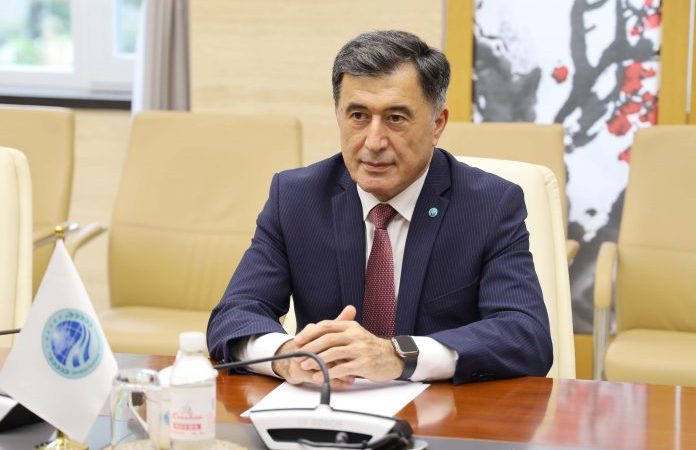Five Year SCO Development Strategy until 2025: Vladimir Norov

By Ansar Mahmood Bhatti
The SCO Secretary General Vladimir Norov gave an exclusive interview to Daily Islamabad Post, DNA News Agency and Cetnreline journal. The Secretary general talked about future roadmap of the SCO. He also unfurled detailed program till 2025. Here are excerpts from his interview.
July 10, 2017, marks the fifth anniversary of the adoption of the Shanghai Cooperation Organization’s Development Strategy until 2025. In this regard, it is important to look at this historic document in terms of its contribution to the development of the Organization and its role in maintaining peace and stability in the region and throughout the world. I will try to retrospectively tell about its meaning and filling with real content in recent years.
The document was developed following the decision of the 2014 Dusanbin SCO summit. Experts from ministries and departments, representatives of the research, and analysis circles of member states were brought in to work on it. It was solemnly signed at the UFA Summit of the SCO on July 10, 2015.
The strategy included a forecast of the development of the international and regional situation, as well as the activities of the SCO itself, its upcoming role in the region and the world. It reaffirms the commitment to the goals, objectives, and principles enshrined in the founding documents of the SCO.
The strategy can be compared to the SCO Charter and the Treaty on Long-Term Neighborhood, Friendship, and Cooperation of member states. The document is a kind of road map for a decade. Each of its positions is in the national interest of all Member States, as well as in the interests of long-term joint development in the vast SCO space.
The document emphasizes that member states “respect the right to choose the path of political, economic, social and cultural development, taking into account the historical experience and national characteristics of each state, promote inter-civilization dialogue, general peace, progress, and harmony, are guided by the principles of non-interference in internal affairs, respect for the sovereignty and territorial integrity of the SCO member states and do not support the application of unilateral measures of pressure without the approval of the UN Security Council.”
The strategy confirmed that the SCO’s activities will never be directed against third countries and international associations. Member States are proceeding from the immutable principle of the SCO Charter to prevent any illegal actions against the interests of the SCO. The document clearly states that the Organization does not aspire to be a military-political bloc or an integration economic association with supranational governments.
Regional security and rapid response to emerging challenges and threats arehighlighted, and the development of transport and infrastructure, energy, agriculture, finance, information and communication technology, innovation, culture, education, and the environment is highlighted in the context of economic dialogue.
Much attention is paid to working together to counter modern challenges and threats, to cooperate on countering terrorism, separatism and extremism, drug and psychotropic illicit trafficking, weapons, and other transnational criminal activities. The main platform for member states to work together in this area is the SCO Regional Anti-Terrorism Structure, whose activities are aimed at coordinating the joint efforts of the competent authorities of the member states of the Organization to identify, prevent and suppress the “three evils”.
The issues of strengthening security in the SCO space are emphasized on joint anti-terrorist exercises and special border operations.
The practical implementation of the Strategy was the signing of a wide fan of documents, which led to the strengthening of cooperation in various fields. These include the SCO Convention on Countering Extremism, the Action plan for 2018-2022 on implementation of the provisions of the Treaty on Long-Term Neighbourhood, Friendship and Cooperation of SCO Member States, SCO-member Cooperation Program in Countering Terrorism, Separatism and Extremism for 2019-2021, SCO Anti-Drug Strategy for 2018-2023 and the Programme of Action to Implement It, protocol on the SCO Contact Group.
The implementation of the Strategy was the admission of India and Pakistan to the SCO. The organization has taken a pronounced transcontinental character. It has strengthened its attractiveness and high openness rating on the international scene.
The dynamic development of SCO international contactswith UNESCAP, UNESCO, FAO, and UNWТОhas alsobeen boosted.
On the sidelines of the Bishkek Summit in June 2019, a Memorandum of Understanding was signed with the Astana International Financial Centre, and last November cooperation with the UN Food and Agriculture Organization, FAO, was established. This year, within the framework of the upcoming SCO summit in St. Petersburg, postponed for known reasons for this fall, along with important political documents, a number of documents are planned to strengthen cooperation with inter-Dunaдународными and regional organizations in the economic sphere.
There is a growing number of states and international organizations seeking to establish close partnerships with the SCO. As you know, four countries have observer status under the SCO, Afghanistan, Belarus, Iran, and Mongolia. Azerbaijan, Armenia, Cambodia, Nepal, Turkey, and Sri Lanka are partners in the SCO dialogue. The authority and influence of the SCO are constantly growing and growing thanks to successful and open activities. In addition to observer States and partners, applications for accession to the SHOS process continue to be received by the Organization.
In order to continue to work with observers and dialogue partners, the SCO Council of Foreign Ministers adopted the relevant Roadmap until 2022 in May 2019.
The SCO space is a huge market for mutually beneficial trade and economic cooperation, implementation of joint projects covering almost all sectors of the economy. In this context, trade and economic issues play a significant role in the SCO Development Strategy.
The strategy served as the basis for the signing of the SCO Multilateral Trade and Economic Cooperation Programme in 2019 in a new edition, It isетияa comprehensive document that meets the requirements of the modern world and takes into account the quality of the composition ofour Organization’s membership.
In today’s environment, the possibilities of digitalization and information and communication technologies demonstrate their high efficiency and demand. The strategy envisages cooperation between SCO countries in the development of information and communication technologies, taking into account the generally accepted and approved by the International Telecommunication Union telecommunications standards.
In order to further advance the partnership in this direction, the concept of cooperation in digitalization and information and communication technologies was approved at the SCO Bishkek Summit in June 2019. According to some estimates, the digital economy now accounts for about 20% of world trade and, in the context of a global pandemic, this volume could increase to 25% by 2025. In this regard, active work has been launched among SCO member states to prepare a general document on e-commerce.
The Strategy also focuses on improving the transit capacity of the SCO and the formation of regional transport and transit corridors. An important area of joint work is cooperation in the field of infrastructure modernization and logistics, including by expanding the network of international logistics centers in the SCO space and forming a network of industrial clusters along transport arteries.
In order to achieve these goals, we are working to develop a modern transport route system in the region. Expert work on the development of roads, the creation of an integrated transportation management system, and the interaction of railway administrations are actively progressing.
More than 13 million people have been laid on the territory of the SCO countries. more than 312,000 km of railways, or almost 20% of the world’s highways, operate, contributing to regional transport interconnectivity.
The strategy was the impetus for the signing in 2019 in Tashkent of the Concept of Interaction of Railway Administrations (Railroads) of SCO member states, which creates a legal basis for the development of international transport corridors and the development of regional trade.
The previous 5 years were full of bright events and effective actions toexpand cultural and humanitarian ties.
Particular attention was paid to the development of cultural ties within the SCO,the harmoniouscoexistence of different nationalities, the active dissemination of knowledge about centuries-old traditions and customs of the peoples of the member states of the Organization.
Much has been done by the Organization for its upcoming 20th anniversary, which will be celebrated next year. Work has been stepped up to preserve cultural and natural heritage, including UNESCO World Heritage sites in the SCO space, the creation of registers of architectural monuments, the training of specialists in the areas of cultural heritage protection and the restoration of works of art.
A musical project “Nine Magic Notes” was implemented aimed at getting acquainted with the musical art of SCO member states. The event was attended by well-known pianists from eight SCO memberstates.
For the first time, the SCO Film Festival was held within the Organization, which was attended by filmmakers from 12 SCO families. As a result of the event, 12 agreements on cooperation in the field of cinema were signed, and new prospects for cinematic exchange and interaction of SCO countries were opened.
For five years we successfully carried out the tasks to further increase mutual tourist flows, improve the quality of tourist services, organize tourist-fairs,create new tourist routes.It should be noted that over the last period the Tourism Cooperation Development Programmein the field of tourismhas beenadopted, which aims to create favorable conditions for mutual tourist travel, tourism forums, seminars, and roundtables.
In 2019, the SCO Secretariat launched the “Eight Wonders of the SCO” project.
One of the priorities was the development of education, improving the effectiveness of scientific research of SCO memberstates. The concept of the SCO scientific and technical partnership and the Plan for Practical Measures for Cooperation of SCO Member States’ Research Institutions for 2019-2020. There is active coordination work on the implementation of the curriculum of the SCO University.
International and regional sporting events were actively pursued, joint actions were taken to develop physical culture and sports, create conditions for the preservation of national sports, promote them, and promote healthy lifestyles. The Legal Platform for the Development of Such Cooperation was the Agreement on Cooperation in Physical Culture and Sports.
The annual SCO Kunming Marathon was a bright sporting event. Despite the fact that the marathon has a short history, the awarding of a silver license to it by the International Association of Athletics is a testament to the recognition of its demand and importance.
The Strategy places important importance on environmental cooperation. In line with its implementation, the SCO Member States’ Concept for Environmental Cooperation and the SCO Urban Welfare Program was signed. For the first time, the mechanism of the Meeting of Heads of Ministries and Environmental Agencies waslaunched.
The SCO remains a priority in increasing cooperation in the field of health, including in the area of countering the spread of infectious and non-communicable diseases, responding to health emergencies. In order to achieve the goals in stages, a Plan for The Key Measures for the Development of SCO Health Cooperation for 2019-2021 was adopted.
The coronavirus epidemic has shown the increased importance of ensuring health and epidemiological well-being in the region.
In order to implement the provisions of the Strategy, a five-year action plan for its implementation was approved in 2016, which includes 75 practical measures aimed at improving the Organization’s multidisciplinary activities.
The first five-year term demonstrated the effectiveness and effectiveness of the Strategy, its focus on further strengthening and developing mutual trust, promoting long-term peace and joint development in the region and the world at large. An analysis of the results of the 2016 Action Plan for the Implementation of the Strategy shows that all the objectives outlined in it have been fulfilled. In this regard, Member States have begun to develop a new Action Plan for the next five-year term, the draft of which already includes about 150 activities, which confirms the expansion of the spheres of cooperation between SCO member states. In the autumn of this year, during the next 20th SCO Summit in St. Petersburg, it is planned to adopt an Action Plan to implement the Organization’s Development Strategy until 2025 for the next five years.
The strategy continues to effectively promote multidisciplinary regional cooperation, political stability, security, economic cooperation, joint development, and prosperity of the SCO peoples.
The phenomenon of the successful progressive development of the SCO is that member states firmly and consistently follow the “Shanghai spirit” embodying mutual trust, mutual benefit, equality, mutual consultation, respect for multiculturalism, the desire for joint development.
Related News

The largest halal fair in Russia will open on 14 MAY
ISLAMABAD, /DNA/ – More than 40 thousand visitors and 4.5 thousand goods according to HalalRead More

Saudi Foreign Minister to visit Pakistan
DNA ISLAMABAD: A high-level Saudi delegation, led by Foreign Minister Prince Faisal bin Farhan binRead More


Comments are Closed